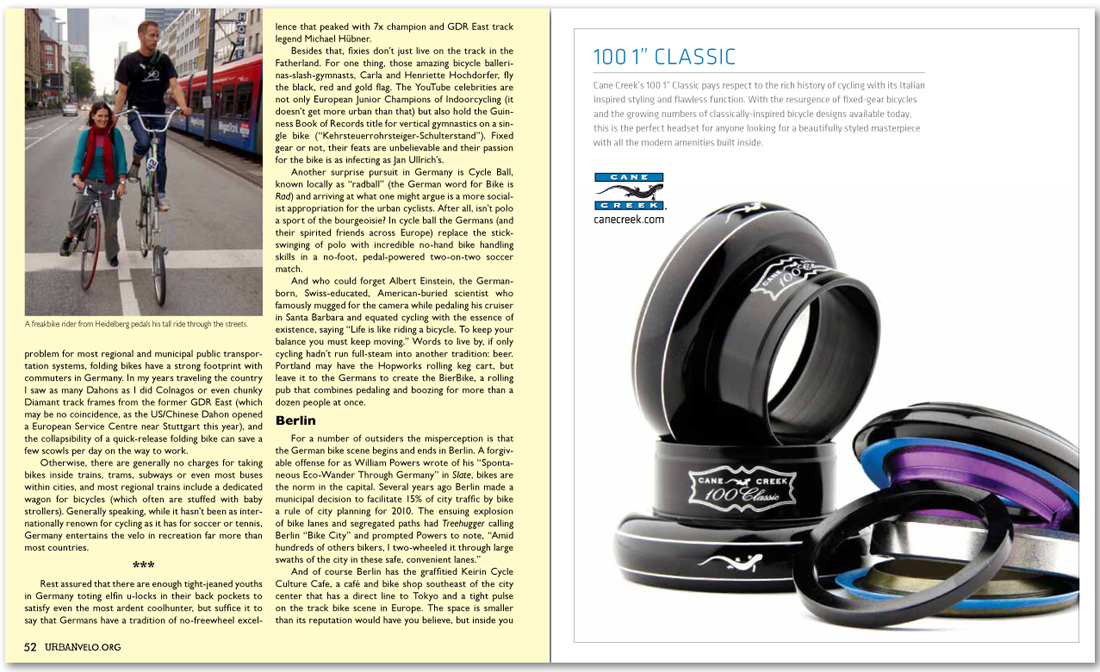


problem for most regional and municipal public transportation systems, folding bikes have a strong footprint with commuters in Germany. In my years traveling the country I saw as many Dahons as I did Colnagos or even chunky Diamant track frames from the former GDR East (which may be no coincidence, as the US/Chinese Dahon opened a European Service Centre near Stuttgart this year), and the collapsibility of a quick-release folding bike can save a few scowls per day on the way to work.
Otherwise, there are generally no charges for taking bikes inside trains, trams, subways or even most buses within cities, and most regional trains include a dedicated wagon for bicycles (which often are stuffed with baby strollers). Generally speaking, while it hasn’t been as internationally renown for cycling as it has for soccer or tennis, Germany entertains the velo in recreation far more than most countries.
***
Rest assured that there are enough tight-jeaned youths in Germany toting elfin u-locks in their back pockets to satisfy even the most ardent coolhunter, but suffice it to say that Germans have a tradition of no-freewheel excellence that peaked with 7x champion and GDR East track legend Michael Hübner.
Besides that, fixies don’t just live on the track in the Fatherland. For one thing, those amazing bicycle ballerinas-slash-gymnasts, Carla and Henriette Hochdorfer, fly the black, red and gold flag. The YouTube celebrities are not only European Junior Champions of Indoorcycling (it doesn’t get more urban than that) but also hold the Guinness Book of Records title for vertical gymnastics on a single bike (“Kehrsteuerrohrsteiger-Schulterstand”). Fixed gear or not, their feats are unbelievable and their passion for the bike is as infecting as Jan Ullrich’s.
Another surprise pursuit in Germany is Cycle Ball, known locally as “radball” (the German word for Bike is Rad) and arriving at what one might argue is a more socialist appropriation for the urban cyclists. After all, isn’t polo a sport of the bourgeoisie? In cycle ball the Germans (and their spirited friends across Europe) replace the stick-swinging of polo with incredible no-hand bike handling skills in a no-foot, pedal-powered two-on-two soccer match.
And who could forget Albert Einstein, the German-born, Swiss-educated, American-buried scientist who famously mugged for the camera while pedaling his cruiser in Santa Barbara and equated cycling with the essence of existence, saying “Life is like riding a bicycle. To keep your balance you must keep moving.” Words to live by, if only cycling hadn’t run full-steam into another tradition: beer. Portland may have the Hopworks rolling keg cart, but leave it to the Germans to create the BierBike, a rolling pub that combines pedaling and boozing for more than a dozen people at once.
Berlin
For a number of outsiders the misperception is that the German bike scene begins and ends in Berlin. A forgivable offense for as William Powers wrote of his “Spontaneous Eco-Wander Through Germany” in Slate, bikes are the norm in the capital. Several years ago Berlin made a municipal decision to facilitate 15% of city traffic by bike a rule of city planning for 2010. The ensuing explosion of bike lanes and segregated paths had Treehugger calling Berlin “Bike City” and prompted Powers to note, “Amid hundreds of others bikers, I two-wheeled it through large swaths of the city in these safe, convenient lanes.”
And of course Berlin has the graffitied Keirin Cycle Culture Cafe, a café and bike shop southeast of the city center that has a direct line to Tokyo and a tight pulse on the track bike scene in Europe. The space is smaller than its reputation would have you believe, but inside you
Cane Creek